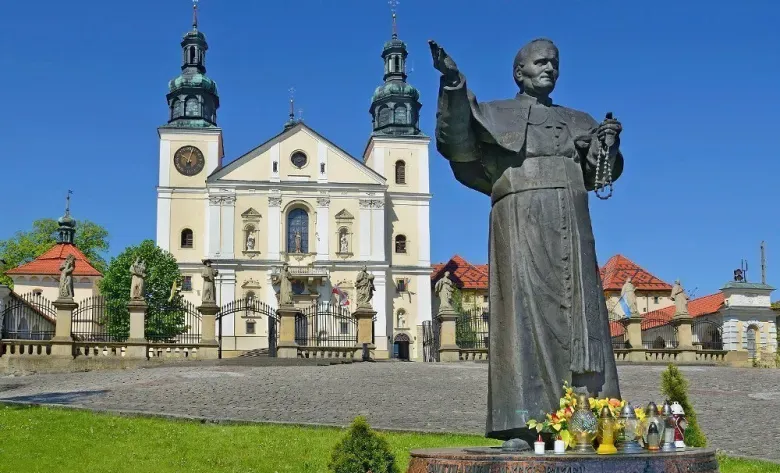
The life and legacy of St. John Paul II, whose birth name was Karol Wojtyła, is a theme that resonates deeply in the history of the Catholic Church and the world at large. Born in Wadowice, Poland, on May 18, 1920, St. John Paul became one of the most influential popes of the 20th century.
His papacy, which lasted from 1978 to 2005, witnessed profound cultural, political and social changes. From his focus on human rights and interreligious dialogue to his role in the fall of communism in Eastern Europe, St. John Paul II left an indelible mark. This article will explore his life, from his origins in Poland to his impact as a spiritual and cultural leader in the world.
St. John Paul II was born into a working-class family. His father, a Polish army officer, and his mother, an educator, instilled in him values of faith, hard work and dedication. The untimely death of his mother when he was only 9 years old marked the beginning of a life that would face numerous adversities. Despite the difficulties, St. John Paul excelled in school and showed an interest in theater and poetry.
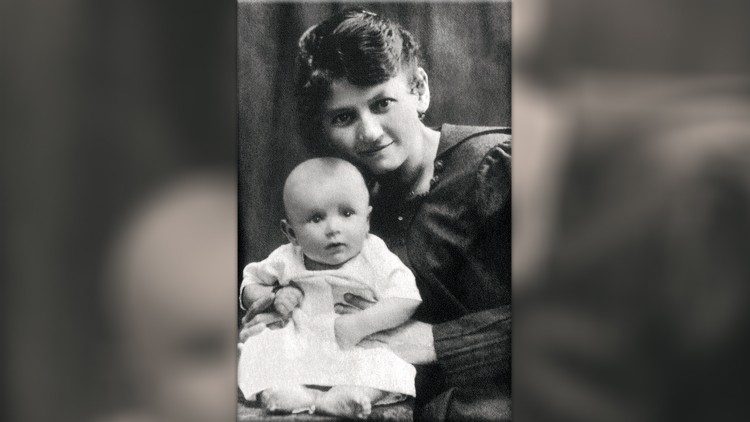
St. John Paul's childhood was deeply influenced by the Catholic community of Wadowice. There, he attended the local church, where he developed a personal relationship with God that would grow stronger throughout his life. This religious foundation was fundamental in his spiritual and moral formation, motivating him to follow a path to the priesthood.
In his youth, St. John Paul witnessed the impact of World War II in Poland, which left a deep mark on his worldview. His relationship with his father, who taught him about the importance of faith and endurance, was vital to his personal development. In addition, his interest in literature and theater led him to explore existential and philosophical themes that would later influence his teachings as pope.
Polish culture, rich in tradition and spirituality, also played a key role in the formation of his identity. The teachings of the Catholic Church in this cultural context provided him with a framework that would guide him in his priestly life and, later, in his papacy.
As Karol Wojtyła moved into adolescence, his commitment to the Catholic faith deepened. He studied in an underground seminary during the Nazi occupation, a testament to his determination and courage. It was a time when many Catholics in Poland faced severe persecution, and his decision to become a priest reflected remarkable courage.
The influence of religious figures and mentors during this time also helped shape his character. St. John Paul II would not only be a religious leader, but an advocate for human dignity and fundamental rights, themes that would resonate throughout his life and papacy.
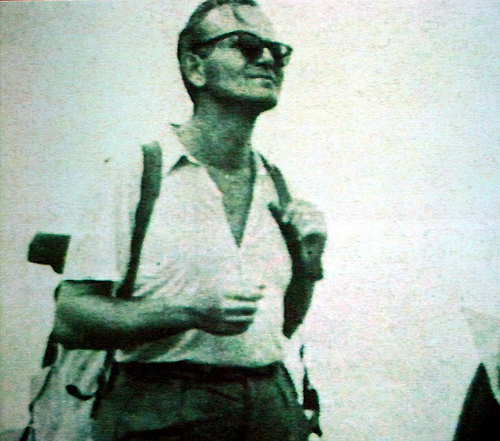
Karol continued his education at the Jagiellonian University in Krakow, where he studied philology and became actively involved in theater. This period at the university not only provided him with a solid academic background, but also allowed him to explore his passion for the arts. Through theater, he developed communication and empathy skills that he would later use in his ministry.
The combination of his love of literature and theater with his growing religious devotion laid a unique foundation for his future. The college experience also allowed him to form meaningful friendships, many of which would remain throughout his life and contribute to his perspective on social and political issues.
The German invasion of Poland in 1939 abruptly interrupted the life of the Karol Wojtyła. The brutality of the war and the Nazi occupation had a profound impact on him, leading him to reflect on the human condition and the need for faith. During this time, he continued his priestly formation in secret, and his passion for social justice began to grow.
The war not only led him to question the nature of suffering, but also strengthened his determination to become a leader who would advocate for the oppressed. This period of adversity was crucial in his development, as it shaped his character and his future mission as pope.
Wojtyła was ordained a priest in 1946 and quickly earned a reputation as a charismatic leader and deep thinker. His work in the diocese of Krakow led him to become involved in social and cultural activities, seeking to connect faith with people's daily lives. During these years, he devoted himself to ministering to youth and working with the working-class community, which foreshadowed his pastoral approach in his papacy.
As he advanced in his career, Wojtyła was appointed auxiliary bishop of Krakow and then archbishop. His ability to dialogue with people of different backgrounds and his ability to tackle difficult issues made him stand out. His time in Krakow provided him with a platform to develop his theological thinking and commitment to human rights.
As Archbishop of Krakow, Wojtyła worked tirelessly to revitalize the Catholic faith in Poland. He organized spiritual retreats and promoted Christian education, establishing formation centers for young people. His innovative approach and connection to the community made him a respected leader, not only in Poland, but also internationally.
Wojtyła excelled in his opposition to the communist regime, defending freedom of conscience and the rights of believers. His commitment to social justice earned him the admiration of both the Catholic community and those fighting for freedom in Poland.
The Second Vatican Council, which took place between 1962 and 1965, was a turning point for the Catholic Church. Wojtyła was present as a bishop and actively participated in the discussion on the modernization of the Church. He advocated an openness to the modern world, emphasizing the importance of interreligious dialogue and the need for the Church to be involved in contemporary social issues.
His participation in the Council strengthened his position within the Church and laid the foundation for his future teachings as Pope. The experience reinforced his belief in the importance of peace and reconciliation in a divided world.
In 1964, Wojtyła was named a cardinal, consolidating his influence within the Vatican. His leadership in Krakow and his active participation in the Council positioned him as a candidate for papacy. During these years, he continued to work for justice and human dignity, establishing a legacy that would accompany him until his election as pope in 1978.
Wojtyła's relationship with young people, as well as his ability to communicate with different groups, made him an internationally respected figure. His charisma and vision of a Church committed to peace and social justice resonated throughout the world.
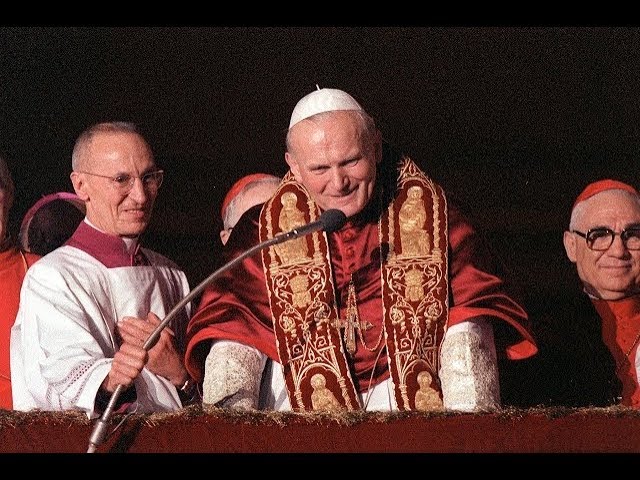
Wojtyła's election as pope on October 16, 1978 marked a historic moment. He was the first non-Italian pope in more than 400 years and his election was greeted with joy around the world, especially in his native Poland. He adopted the name John Paul II, paying homage to his predecessor and signaling his intention to continue his legacy of openness and dialogue.
His papacy began in a complicated international context, with political and social tensions on the rise. John Paul II set out to address these problems from the outset, using his platform to advocate for peace and justice throughout the world.
One of the highlights of his papacy was his dedication to apostolic travel. John Paul II made more than 100 international visits, bringing his message of hope and renewal to millions of people. During these trips, he focused on the importance of human dignity and religious freedom, addressing social and political problems in each country he visited.
His first encyclicals reflected his vision of a Church in dialogue with the modern world. In Redemptor Hominis, he emphasized the centrality of Christ in the life of man, while Dives in Misericordia underscored God's mercy as a response to the injustices of the world. These teachings set a tone for his papacy and laid the foundation for his ongoing commitment to human rights.
John Paul II became an emblematic figure in the struggle against communism, especially in Eastern Europe. His visit to Poland in 1979 was a pivotal event that inspired millions to question the communist regime. His call for freedom and human dignity resonated with the population, giving rise to a solidarity movement that would culminate in the fall of communism in Poland in 1989.
John Paul II's influence on global politics was significant. His close relationship with world leaders, as well as his commitment to interreligious dialogue, contributed to the de-escalation of tensions between the superpowers and promoted peace in various regions of the world.
John Paul II was a pioneer in interreligious dialogue, emphasizing the importance of understanding and cooperation between different traditions. In 1986, he organized a historic meeting with leaders of various religions in Assisi, Italy, where they united in prayer for world peace. This event symbolized his commitment to peace and his desire to build bridges between different religious communities.
His focus on dialogue helped foster greater openness among religions and promoted a sense of unity in diversity. As he reached out to other traditions, his message of respect and love spread, laying the foundation for a more peaceful future.
The defense of human rights was a pillar of John Paul II's papacy. His work in this area was not only limited to the fight against communism, but also encompassed issues such as racism, poverty and social injustice. He was a fervent defender of human dignity, advocating for the oppressed and denouncing violations of fundamental rights.
In his famous 1995 speech on the anniversary of the United Nations, John Paul II urged the international community to work together for a more just and equitable world. His focus on human dignity and social justice made him a powerful voice in the international arena, influencing policy and promoting significant change.
John Paul II was a pope particularly beloved by young people, to whom he dedicated a special place in his ministry. He established World Youth Days, an initiative that brought together millions of young people from around the world in celebrations of faith and community. These events not only strengthened the faith of young people, but also provided them with a platform to voice their concerns and aspirations.
His message to young people emphasized the importance of hope, authenticity and commitment to Christian values. Through his interaction with them, John Paul II left an indelible mark on the lives of many young people, inspiring them to live with purpose and dedication.
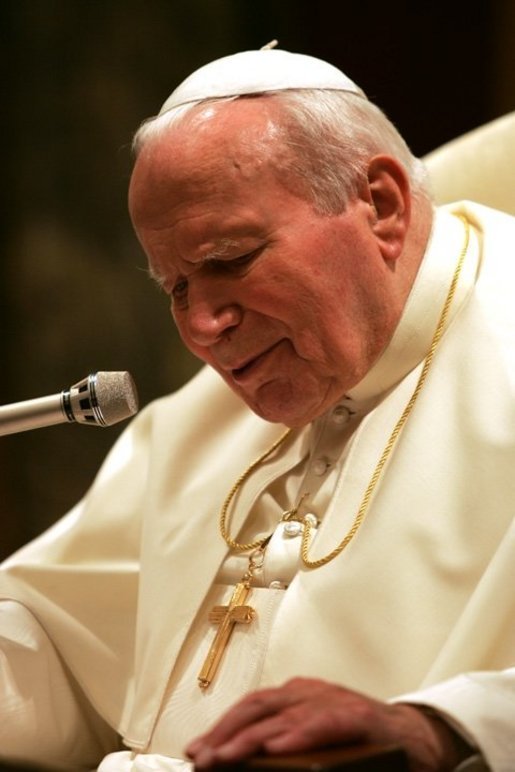
St. John Paul II was canonized on April 27, 2014, a recognition of his life of service and his impact on the Church and the world. His canonization was a significant event, drawing millions of pilgrims to Rome to celebrate his legacy. This recognition not only solidified his place in the history of the Catholic Church, but also reaffirmed his continuing influence.
The canonization was a moment of reflection on his life and teachings. Many people remembered his dedication to peace, justice and human dignity, considering his legacy as an example for future generations to follow.
St. John Paul II's legacy goes beyond his time as pope. His focus on human dignity, social rights and interreligious dialogue continues to influence contemporary thought. Organizations and movements promoting social justice often cite his teachings as inspiration and guidance in their work.
In addition, his emphasis on the importance of family and life has left a lasting mark on modern society, where the defense of family values and respect for life are topics of ongoing discussion. His legacy is still present in culture, politics and spirituality throughout the world.
The memory of St. John Paul II is celebrated around the world through various activities and events in his honor. From memorial Masses to social justice initiatives, his life and teachings continue to inspire millions. World Youth Days, which he established, remain a prominent event on the Church's calendar, fostering faith and community among young people.
Cities and communities have also erected monuments and spaces dedicated to his memory, recalling his commitment to peace and dialogue. His legacy lives on in the lives of those who seek to follow his example of love, hope and service to others.
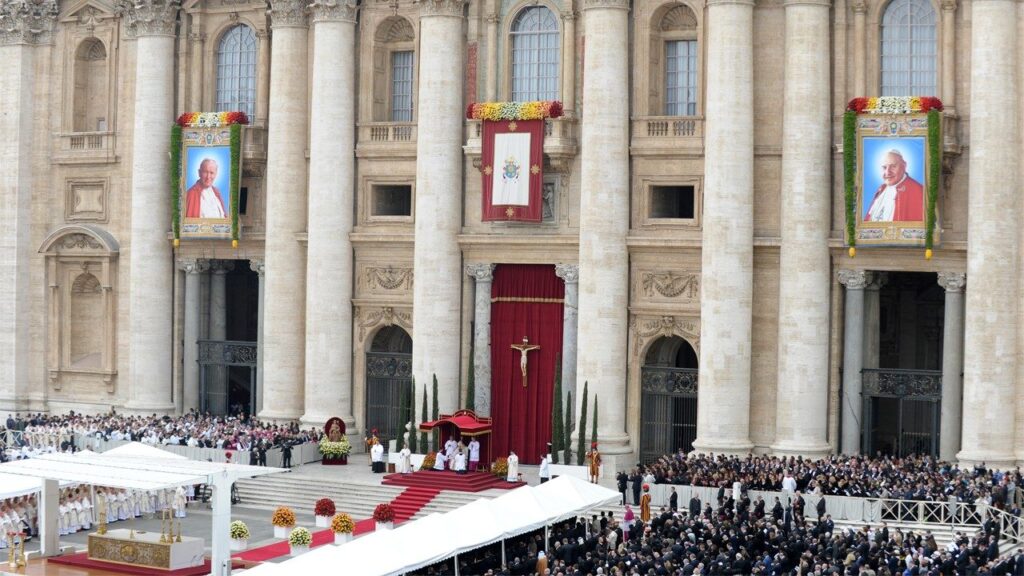
The life and legacy of St. John Paul II is a testament to an individual's ability to influence the world through faith, dedication and love. From his childhood in Wadowice to his papacy and beyond, his message of human dignity and justice continues to resonate today. In a world that often faces conflict and division, his life reminds us of the importance of working for peace, mutual respect and unity.
The figure of St. John Paul II is not only a symbol of the Catholic faith, but also a beacon of hope for all those who seek justice and reconciliation in society. His legacy will live on in the collective memory, inspiring future generations to follow his path of love and service.
St. John Paul II was elected Pope on October 16, 1978.
St. John Paul II played a crucial role in inspiring the Solidarity movement in Poland, which was instrumental in the fall of the communist regime in 1989.
John Paul II advocated for human dignity and fundamental rights throughout the world, confronting social and political injustices both at home and globally.
John Paul II promoted interreligious dialogue as a way of building bridges between different traditions, emphasizing mutual respect and understanding.
His legacy continues to inspire movements for justice, peace and human dignity, as well as celebrations and events in his honor around the world.
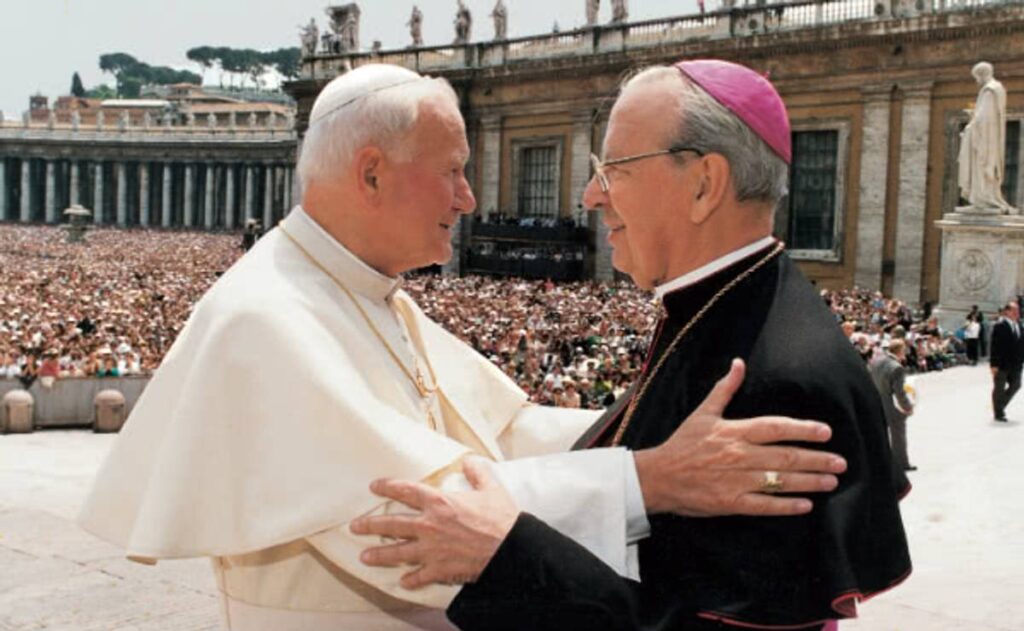
Blessed Alvaro del Portillo was inspired by Saint John Paul II to carry out the Roman Academic Center of the Holy Cross erected on January 9, 1985 by the then Congregation for Catholic Education.
Saint Josemaría Escrivá Opus Dei's founder, had desired a center of university studies that, in collaboration with other universities in Rome, would carry out a broad and profound work of research and formation in the various ecclesiastical sciences, at the service of the whole Church.
The challenge was taken up by his successor, Bl. Álvaro del Portillo The project was materially carried out by him, directing the entire execution phase and assuming the role of first Grand Chancellor.
With the passage of time and with the addition of other academic activities, the Center became
the Roman Athenaeum of the Holy Cross, with the Faculties of Theology, Philosophy, Canon Law and the Higher Institute of Religious Sciences of Apollinare.
On June 26, 1995, Saint John Paul II conferred on the Ateneo the title of Pontifical. Three years later (1998), with the establishment of the fourth Faculty of Institutional Social Communication on February 26, 1996, the title of Pontifical University was finally conferred.